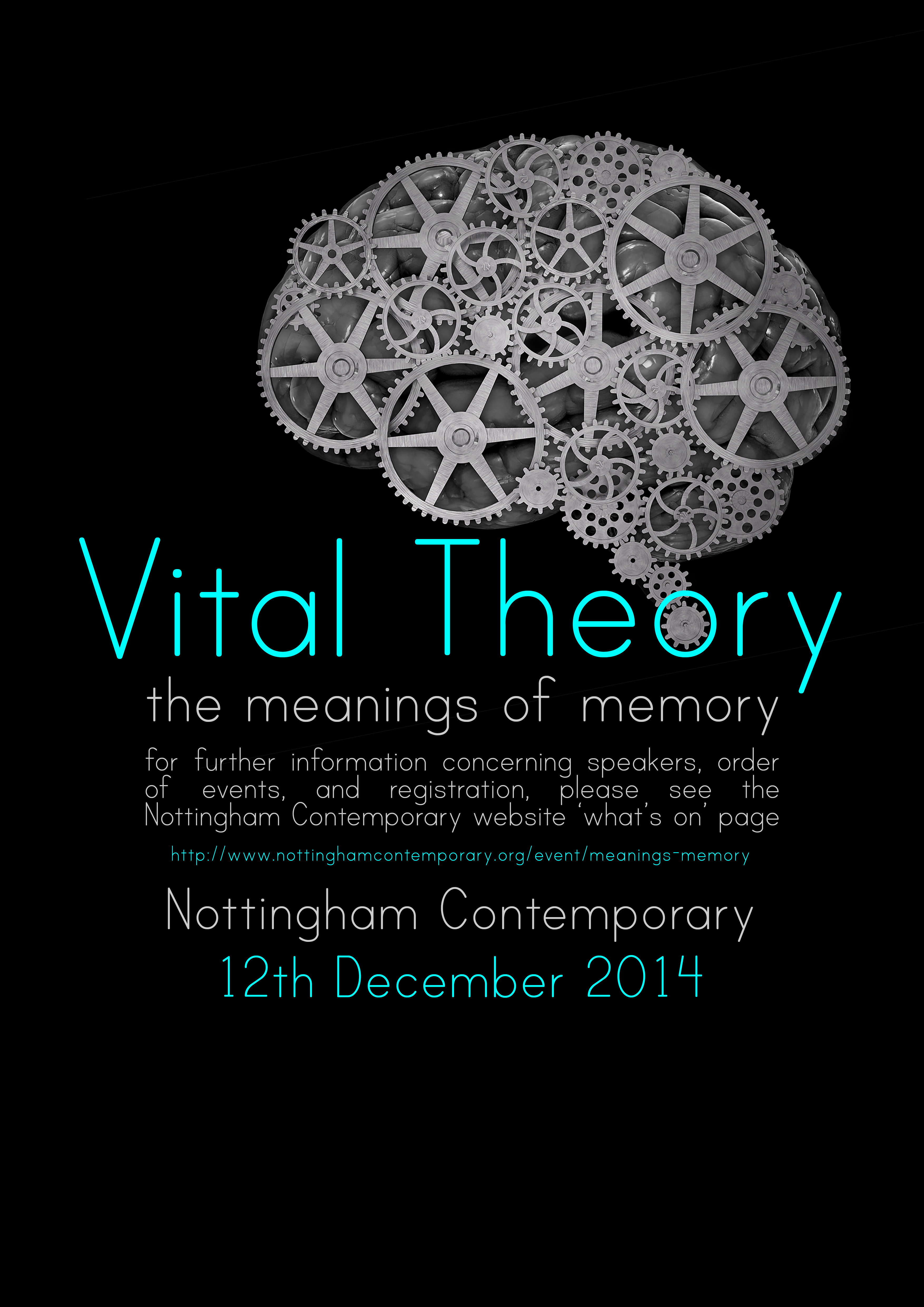
December 9, 2014, by Gianlluca Simi
Vital Theory 2014: Provisional Programme
This is a provisional programme for the day.
9:30-10:00 — Coffee and Registration
10:00-10:30 — Keynote speakers
Dr Tracey Potts — Poppies and Bones: Kitsch and the Aesthetics of Remembrance
Dr Andrew Goffey — TBA
10:30-12:15 — Position Papers
The meanings of memory — by Stefanie Petschick
This year Vital Theory asks the question ‘What do we mean when we talk about memory’? This paper explores some of the different meanings of ‘memory’ that circulate in academic and public discourse: memory as individual recollection, memory as shared narrative of the past, memory as our national heritage, memory as the artefact that non-verbally tells a story of the past, memory as the unearthed fragment of history that, long forgotten, re-surfaces traumatically. This paper looks critically at what these different meanings of memory have in common and what conflating these diverse ideas into one highly flexible signifier entails. What is gained and what is perhaps lost as these different notions merge? Paradoxically, in raising these questions the paper itself engages in some form of remembering. Looking for concepts such as ‘identity’, ‘culture’, ‘ideology’ and ‘history’ that seem to have partly been replaced by the proliferation of the meanings of memory, the paper commemorates those early authors on the concept of memory that powerfully articulated this critical vocabulary together with a political meaning of memory.
Media and commemoration: the seasonal reproduction of the the myth of the gaúcho in TV advertisements — by Gianlluca Simi
Rio Grande do Sul, the Southernmost state of Brazil, historically builds its identity upon the mythical figure of the gaúcho – the noble, fearless cowboy from the Ragamuffin War (1835-1845). Although being a pervasive figure in the local imaginary, every year around September the gaúcho is revived by media campaigns praising a conveniently-selected set of values and characteristics which are seen to compose the essence of gaúcho people. This set, however, ignores unflattering aspects of the war and reproduces a somewhat unrealistic image of the past, which is then used to both distance the state’s identity from an imagined central Brazilian identity as well as oppose to certain paradigm shifts on the basis of tradition. This paper is thus concerned with the selective references to the past in building a collective memory that ultimately works so as to ascertain the maintenance of certain social structures.
The work of remembering: transitional societies, memory, and the expansion of global capital — by Josh Bowsher
Since the rise of human rights, which followed the collapse of communism, the concept of memory and remembrance has been increasingly mobilised in the wake of mass conflict and the fall of “totalitarian” regimes. But what is memory in these contexts and what is its function? This paper will position the use of memory in these contexts as work or labour expected to be undertaken by the member of societies following their emergence from these painful pasts. It will argue that the function of this labour is both “anti-catastrophic” and “reconstructive.” Anti-catastrophic because the injunction to remember is designed to ensure the past repeats itself “never again”. Reconstructive, because as Martha Minnow points out, in these contexts, to remember is also to “re-member”, that is, to reconstitute society. Given that this work is often demanded in the context of transitions to liberal democratic societies replete with neoliberal economic policies, the paper will consider the relationship between memory and the reconstruction of society along neoliberal lines. In particular, it will point towards the production of collective memory, as a process which mediates – and gives meaning to – individual experiences through discourses such as human rights. These discourses, it will be argued, give the past – and the future – a particular inflection which is amenable to the expansion of global capital.
12:15-13:00 — Lunch
13:00-14:30 — Objects Roundtable: this section aims at using objects which participants find to evoke discussion about memory
14:30-14:45 — Break
14:45-16:30 — Anti-Market
Gloria Anzaldúa, Karl Marx, Judith Butler, Jacques Lacan, Tiqqun, Michel Foucault, Henri Lefebvre, ‘Critical Theories of Fashion’, and Guy Debord.
16:30-onwards — Theory Secret Santa (at Das Kino)
No comments yet, fill out a comment to be the first

Leave a Reply